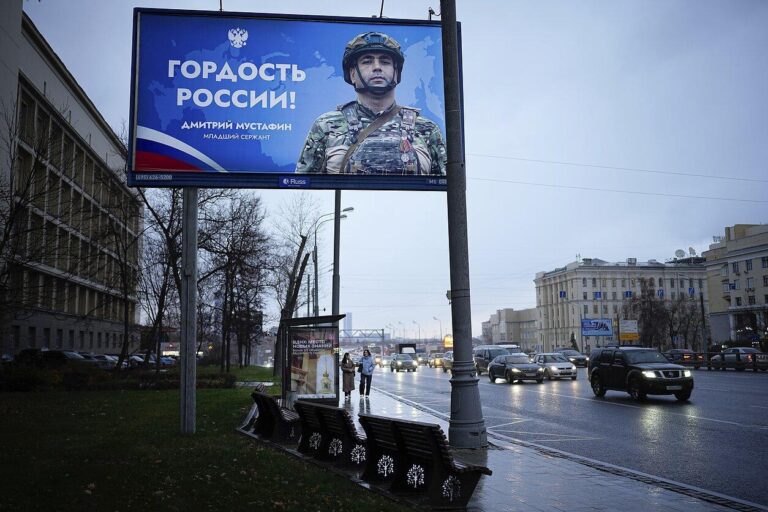The Economic Consequences of the Ongoing Conflict in Ukraine
As the war in Ukraine enters its third year, the repercussions on Russia’s economy are becoming increasingly evident, raising concerns about the Kremlin’s capacity to maintain its military operations. The combination of Western sanctions, escalating warfare costs, and a shrinking workforce has created a precarious situation that threatens to derail moscow’s ambitions. Experts believe that this economic pressure could be what finally drives Russian leaders toward negotiations, despite their previous reluctance.This article delves into the complexities of Russia’s wartime economy, examines the effects of extended military engagement, and considers potential diplomatic avenues as circumstances evolve.
Evaluating the Economic Repercussions of Sanctions on Russia’s Military Capabilities
The stringent economic sanctions levied against Russia have significantly impacted its ability to conduct military operations effectively. As hostilities persist, the consequences of these restrictions are becoming more pronounced. Here are several critical factors illustrating how sanctions are straining Russia’s wartime economy:
- Limited Access to Financial Resources: Sanctions have obstructed Russian financial institutions from engaging with international markets, curtailing their ability to fund military initiatives.
- Disruptions in Supply Chains: Vital supplies such as military hardware and technology face considerable challenges due to export restrictions imposed by Western nations.
- Inflation and Resource Shortages: The nation is experiencing soaring inflation rates that diminish purchasing power essential for maintaining military readiness.
Considering these obstacles, Russian authorities have had no choice but to reassess spending priorities and modify their strategies accordingly. Recent evaluations reveal significant changes in areas such as military procurement and resource distribution:
| Military Sector | Saction Impact |
|---|---|
| Ammunition Production | Pushed back timelines and compromised quality standards |
| Sourcing & Logistics | Burgeoning expenses due to supply chain disruptions |
The cumulative impact of global sanctions may ultimately force Moscow into seeking diplomatic solutions as it becomes increasingly uncertain whether it can sustain its current level of military engagement.Analysts predict that if these economic challenges continue unabated, Russian leadership may be compelled to reevaluate its approach within this ongoing conflict.
The Influence of Energy Market Variability on Moscow’s Strategic Choices
The volatility in energy prices is pivotal in shaping Moscow’s strategic decisions during this ongoing conflict with Ukraine.Given that Russia heavily depends on oil and gas exports for revenue generation,fluctuations in global energy markets directly affect its financial stability. A downturn in energy prices could severely restrict Kremlin funding for extended military efforts while forcing a reassessment of geopolitical goals. Key elements influencing these price shifts include:
- Diminished Global Oil demand: economic slowdowns across major economies can lead to reduced consumption levels for oil and gas products.
- OPEC+ Policy Changes: Adjustments made by leading oil-producing nations regarding output can significantly sway market prices.
- Tensions Between Nations: Conflicts or sanctions often result in instability within energy markets.
Evidently strained under mounting sanctions alongside high defense expenditures,the urgency for stabilizing energy revenues has never been more critical.As market dynamics shift alongside fluctuating energy prices,Moscow might find itself increasingly motivated towards negotiation efforts aimed at restoring economic equilibrium.The table below outlines how variations in energy pricing could influence the Russian economy:Â Â
Changes In Energy Prices Economic Impact  Possible Strategic responses Increase Revenue surge; enhanced funding for defense Continuation or escalationof hostilities Stable Moderate income; chancefor recovery Openness todiplomatic discussions; reevaluationof conflict tactics. DecreaseFalling revenues; pressureon public finances.< ;t d > ;Pursuitof negotiations; considerationof withdrawal options.
< ;/t d > ;</ tr ></ tbody ></ table >Exploring Diplomatic Options Amidst Economic Challenges
The mounting economic pressures place Russia at a crucial crossroads where diplomatic possibilities appear more viable than ever before.The intense strain on its wartime economy—exacerbated by international penaltiesand rising operational costs—is prompting Moscowto rethinkits existing strategies.Experts assertthat prolonged warfarehas not only depleted resources but also revealed weaknesseswithinRussia’seconomic structure,paving potential pathwaysfor negotiation.Key considerations influencingthese deliberations include:
- Dwindling Foreign Investments: the departureof key corporations has hinderedeconomic growth.
- Evolving Domestic Discontent: Public dissatisfactionis escalatingduein partto inflationand resource shortages.
- tenuous Alliances: Relianceon limited partnersmay compelRussia toreassessits positionin broadergeopolitical contexts.
Additionally,recent developments suggesta tentative shiftinMoscow’sconflict resolutionapproach.Previous hardline stancesmight softenas leaders recognize sustainablepeacecould arise from addressingunderlyingeconomic disparities.This may involve exploringregional collaborationsand negotiatingconcessionsaimedat alleviatingimmediate pressures.A potential outlinefor negotiation avenuescould resemblethe following:Â
<th Negotiation Pathway" "potential Outcomes" “Economic Sanction Relief” “Expanded trade opportunitieswithWestern nations” “Ceasefire Agreements” “Stabilizationin contestedareas” “Energy Collaboration Initiatives” “Access tomarketsoptions”
</tableConclusion: Navigating Uncertainty AheadÂ
</ h2As financial burdens stemming from war continue torise,Russia faces an uncertain future.The interplaybetweeneconomic distressandmilitary aspirationsmay ultimately reshapeMoscow’sstrategiesregardingthe ongoing conflict.Should persistentwar-economy pressuresdriveKremlinto reconsideringitsposition,the prospectofdiplomacycould emergeas alightattheendofthetunnel.As global observersremain vigilant,the evolving dynamicswill playa crucial roleindeterminingwhetherawillingnesstoengageindialoguecanemergefromthedepthsofmilitarystrife.Time will revealif economic realitieswill facilitatepeaceor further entrenchhostilities.
- Evolving Domestic Discontent: Public dissatisfactionis escalatingduein partto inflationand resource shortages.
- Dwindling Foreign Investments: the departureof key corporations has hinderedeconomic growth.




